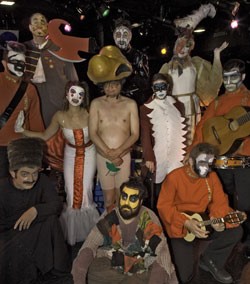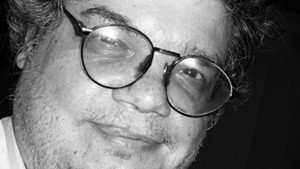
- Matthew Thorsen
Conventional wisdom suggests that when a person loses the ability to use one sense, the other senses compensate by becoming sharper. Not so in The Nose, writer-director Aaron Masi’s original stage adaption of 19th-century Russian author Nikolai Gogol’s short story of the same title. When a gentleman’s nose goes missing in this satirical tale, total nonsense ensues.
When it was published in the 1800s, Gogol’s social critique spoke to the common maladies of Russian life at the time — poverty and bureaucracy — as well as social status and love. In The Nose, produced by Green Candle Theatre Company and currently running at Burlington’s FlynnSpace, the Russian writer’s original intention yields to a frothy, rambunctious subversion of theatrical conventions. While the play honors Gogol’s absurdist vision, its driving force is artfully wacky stagecraft.
The Nose concerns the plight of one Major Kovaliov, played by Ethan Alsruhe. He’s a self-important “collegiate assessor” in the city of Petersburg who is angling for a higher-ranking position and the hand of Aleka Podtochina (Laura Wolfsen). Although Aleka and her mother, Madame Podtochina (Tracey Girdich), have consented to the marriage, Kovaliov bides his time to prolong his social privileges as a courtier: free food and drink in the company of fine ladies.
Meanwhile, in another ward of the city, barber Ivan Yakovlevich (Alex Dostie) finds a human nose in his bread. Compounding the horror of his discovery he’s nursing a hangover and has no recollection of the night before. When Yakovlevich tries to discard the nose, he’s apprehended and jailed by the local authority, Inspector Astrovsky (Michael Jordan Evans).
Elsewhere in Petersburg, Kovaliov arises from his bed to face a shocking sight: His nose has vanished. In a panic, he starts tracking it down, while avoiding contact with key members of his social circle, especially the Podtochina women.
In the play’s most absurd stroke, the liberated nose, mobilized by the underwear-clad body of Josh Bridgman, declares itself an independent citizen and goes looking for a job.
The first visual clue that The Nose isn’t another dusty period drama is the makeup artistry of Sara Glasgow and Rebecca Reil. Some characters sport slatherings of greasepaint more reminiscent of a Kiss performance than a Russian metropolis circa 1835. The masquerade effect is amplified in some costumes by Rosie Grannis and Liz Cowee that are almost clownish exaggerations of the attire they’re meant to simulate.
While Masi’s adaptation of Gogol’s story is not that loose in terms of its general premise, a looseness in the play’s execution seems central to his directorial vision. Before Jordan Gullikson, in the role of the Storyteller, begins his narration, other characters engage audience members in chitchat. Girdich’s Madame Podtochina welcomes them; Evans’ Inspector Astrovsky encourages them to seek him out if they run into any trouble in his city; and other characters mingle about, cultivating a sense of audience inclusion in the tale about to unfold.
Throughout the play, characters address audience members directly, sometimes to narrate, sometimes in dialogue and sometimes with an invitation to dance or play a part in a scene. From time to time, characters also address Masi the playwright, who may be sitting in the wings, or break character to direct each other through purportedly botched lines.
The spare set design by artist Dostie, with assistance from Justin Atherton, enhances this fluid, spontaneous quality. The players enter and exit a stage empty save for a small wooden bridge at the center, two rugs thrown down at the wings and a makeshift mirror frame positioned at the top of one riser of seats. A jail cell on wheels makes a few appearances, representing the only substantial other prop. Rows of audience seats surround the stage on three sides, and four café tables cluster along the fourth.
Also throughout the play, the “Nose-kestra” — featuring music/sound designer Jeff Campoli, Nick Trotter and John Thompson-Figueroa — scores the action with simple, Russian-sounding melodies and other motifs played on stringed instruments, drums, keyboards and pennywhistle. Masi also chimes in on trumpet.
More than any of the other effect in this production, the music reinforces the sense that The Nose is not a play in the conventional sense — that is, a piece partitioned into discrete scenes and acts, with a strongly felt divide between player and audience. Rather, this show comes across more as a continuous yarn, sometimes dramatized in scene, sometimes summarized through narration, all of it bound into a theatrical experience by music that rarely ceases for more than a beat or two.
Campoli and Masi’s collaboration here is mostly effective; however, in its relentlessness, the musical accompaniment sometimes fails to contribute to the dynamics on stage, playing merely as ambient music over characters’ pivotal decisions, disclosures and realizations. Sometimes the effect is distracting.
Amidst this circus-like activity, Masi’s actors maintain a high level of energy that, for the most part, prevents the story from flagging. Each brings a few degrees of exaggeration to his or her role — in broad acting styles like street theater or the clowning arts. Dostie’s derelict barber and Evans’ crooked cop play their characters’ signature attributes — scruffiness and sleaziness, respectively — for laughs.
As Aleka, Wolfsen affects a doll-like posture as she traverses the stage in dainty steps, constricted by her tight evening gown, her mouth almost perpetually open in an expression of wonder, shock or glee. (As Yakovlevich’s wife, Praskovia Osipovna, Wolfsen plays a more generic nag.) Girdich’s Madame Podtochina is a more nuanced portrayal that mixes concern for her daughter’s future with bawdy gestures and dreamy incantations.
Reil’s Councilor Chekhtariova is harder to read. She succeeds in passing herself off as a stern, male government official with romantic designs of his own, but her diction — a variation on Barbara Walters — comes across as forced. What’s more, Chekhtariova’s role in the plot is a bit vague. Playing the title character, Bridgman turns in an even, if slightly flat, performance — understandable given the unearthly stage presence of the gigantic nose he wears on his head.
The two most realistic performances come from Alsruhe and Gullikson. As the straight man in this absurd comedy, Alsruhe credibly dispenses pomposity, fury and despair in response to his character’s circumstances, and his swagger justifies nicely his nasal comeuppance. As the Storyteller, Gullikson is a trustworthy guide through this farcical universe; his wry grin and cheeky asides set the play’s tone and put the audience at ease.
A theatergoer expecting a more conventional play might indeed find much to criticize in The Nose. Masi’s skill as a dramatist is evident upon reading Gogol’s original short story — a mere sketch of the full-length play Masi has wrought. Still, this production is confusing at points. Some audience-participation appeals seem superfluous. And the overall looseness that makes the play so inviting occasionally descends into sloppiness.
Still, from the beginning of The Nose to the end, the stage crackles with an energy that Gogol’s original doesn’t. This is not your college English professor’s Russian drama. If that stuff were this zany, you might still be reading it — for fun.










Comments
Comments are closed.
From 2014-2020, Seven Days allowed readers to comment on all stories posted on our website. While we've appreciated the suggestions and insights, right now Seven Days is prioritizing our core mission — producing high-quality, responsible local journalism — over moderating online debates between readers.
To criticize, correct or praise our reporting, please send us a letter to the editor or send us a tip. We’ll check it out and report the results.
Online comments may return when we have better tech tools for managing them. Thanks for reading.